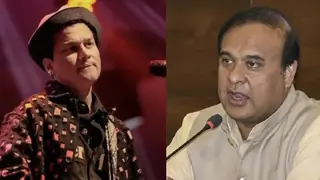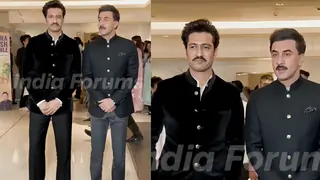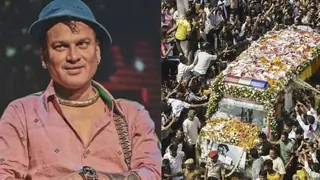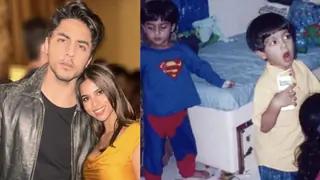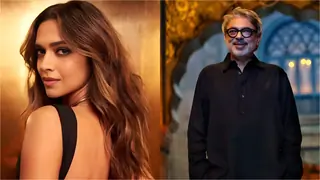Sheltering Melody
Rajiv Vijayakar
His name means 'shelters', as in plural, for the community. Quite aptly, Khayyam's work has been like a melodic shelter for those for whom a song must primarily soothe the senses. The veteran composer entered his 80th year on February 18 and his funda of living a simple, religious life and not lusting for lucre has not only ensured contentment and happiness but has bestowed a strange youth on him - for Khayyam does not look a day above 55! And that's the approximate number of films he has done since the late '40s, averaging less than a film a year!
The man behind musical landmarks like Footpath, Phir Subah Hogi, Kabhi Kabhie, Umrao Jaan and Razia Sultan, mega-serials like The Great Maratha, Dard, Sunehre Warq and Jai Hanuman, and several non-film albums has no negativity towards anyone, least of all the new singers and composers. A philosopher to the core, he considers himself lucky at work and in life, and feels that the many honours, distinctions and awards he has received are primarily due to the unstinting support of his wife, the famous singer Jagjit Kaur ,and the blessings of his musical gurus, Pandit Amarnath, Husnlal and Bhagatram.
Looking around a simple music room studded with a mandir, a frame of Guru Nanak, the Granth Sahib and the Holy Bible as well as the religious emblems of Islam, Mohammed Zahoor Khayyam Hashmi, popularly known as Khayyam, says with a smile, "We conduct aarti twice a day, do our daily pooja, recite from the Quran and the Granth Sahib and kiss the Holy Bible. The positive vibrations from this room spread to my entire household." Screen meets up with the low-profile composer at his Juhu home for a freewheeling chat. Excerpts.
How are you planning to celebrate your 80th birthday?
We will only offer prayers, because we cannot celebrate during Muharram. But for me, the best gift is that I am doing two films that will release this year -Benares 1918 - A Love Story and Yatra.
Benares.. is based on the Munshi Premchand classic Bazaar-e-Husn and is directed by Ajai Mehra, while Yatra is directed by Gautam Ghose with Rekha and Nana Patekar in the principal roles.
What is the scope for music in these films?
Obviously there is a lot of scope for music. You see, I have never been available for any and every film or producer. The media has given me the sobriquet of 'A Moody And Choosy Composer'! This is because I have only accepted films that resonated with me, and where I could do justice to the music and put in a lot of soul. I certainly do not mean that the films I rejected were not up to the mark. On the contrary, I felt that I could not have justified myself in them. I want to feel completely involved in a film, to invest 101 per cent in it, as if the film is produced, directed and written by me! Once that happens, I do not look at things like banners, setups or big names on and behind the screen.
So to answer your question directly, yes, there is ample scope in these films. Yatra for example, is the story of a dancer played by Rekha. Nana Patekar is a writer who is penning her biography. By mutual consent, the choice for her playback has been Asha Bhosle, her voice in Umrao Jaan.
Who are the lyricists and singers working with you in these films?
Kavita Subramaniam, Alka Yagnik and Udit Narayan are my other singers. Ahmed Wasi and Maya Govind are writing the lyrics, while Yatra also has Naqsh Lyallpuri.
What do you think of the newer generation of singers and lyricists?
I welcome them. I will never say that they are not up to the mark. There is so much talent, and they are all working so hard. But they do make me aware that I am very lucky!
Why is that?
Because our generation was blessed with the right filmmakers, great visionaries and poets, and thus the right environment to flower to the full! It takes a lot of these factors to grow from being talented to becoming great talents!
Anu Malik says that he will be happy if he reaches 20% of your calibre in the music score of his version of Umrao Jaan.
I think that Anu Malik is immensely talented and very hardworking. It is unfortunate that his original melodies, many of which are really good, are overshadowed by his image as someone who copies songs.
I am the last person to be hostile about new talent. Many music directors and composers - and one day I will call you home to explain the difference between the two!! - are hostile towards those who replace them. We cannot afford to forget that we too replaced others because kisi ne hamein ek mouqa diya! Yes, the work that the greats have done will be immortal. But new talents - they are all welcome!
How much of today's films or film music do you follow?
Very little, mainly what I see on television. And let me tell you, I do not agree with the so-called ingredients of hit films or music today. Most films today are nothing more than recycled highlights of older films. There is a lot lacking in the songs, and the emphasis on beats, choreography and costumes and of course the cinematography has made the hit ratio sink to an all-time low.
Our culture, for example, has certain values and dignity attached to love - romance is always a private affair. We cannot be romantic in the presence of others, as is seen of late. They call this a trend, which I think is not correct - it is a forced trend for promotion of the music!
The problems with today's songs, as I see it, is that their life depends upon the budgets allocated for the TV promos! Thus a song may remain in public memory for a few days or at the most for a few months! In the olden days, films would be genuine jubilees and songs would be truly popular.
Besides, such trends are dictated only for a miniscule minority of people from a few big cities. But even in the big cities, do we see that kind of brazen culture and public romance? The percentage of such people is so low, which explains the fact that the majority do not identify with such cultures and the music companies are making losses, except with remixes!
You have always hit out at remixes.
Yes. I think that someone should tell the music companies - "Do not touch the golden creations!" Why don't they trust - and test - the younger generation's ability to create something original? Remixes work for two key reasons despite their mutilation on the keyboard: the shakti within the songs and the attractive girls who feature in the videos. The strength within the melodies and lyrics survive even this distortion, proving that good songs alone set trends, and not marketing or publicity!
What is your stand on Western instruments?
In the '50s, I used the solovox, the precursor of the synthesizer and the first electronic instrument. Kalyanjibhai approached me as a musician with his claviolin and I liked his work and he too played for me. Way back in 'Sham-e-gham ki qasam...', Vipin Reshammiya, Himesh Reshammiya's father, played the rhythm-box for me.
One cannot afford prejudice against anything. All instruments in the world, electronic or acoustic, play the same seven notes. It is up to the music director to make them sound soothing and sweet.
You have done less than 60 films in more than 50 years. Is the reason you gave earlier the only one, or is it that you were never supported by big stars who had their teams?
I agree that hits spawn teams, but I have given hits with Dilip Kumar, Raj Kapoor and Amitabh Bachchan. Today, I could have been the maestro of 200 films, but somehow something within me never agreed with the concept of working only for money. And for this my unending gratitude goes to my wife Jagjit, who is the woman behind Khayyam, the successful man. She has not only contributed to my music itself but has always been there for me. Jagjit and my son Pradeep have never been demanding, or critical about my choosiness, because naturally, big money cannot be there with such restricted work and they have willingly made sacrifices. I am proud of them.
And yet as a composer I have never been idle. I have to my credit 225 non-film, high-grade songs in multiple genres like ghazal, bhajan, geet and naat (Muslim devotional songs). I have been extremely lucky to have composed the work of master poets like Ghalib, Meer, Daagh and so many others. I remember Kaifi(Azmi)-saab calling me and saying, "Mera ek kaam tumhein karnaa padega" - he made me compose his poetry - not lyrics - and insisted that either I do it or it will never be done! The album, Shaguftagi, was very well received too. And let me tell you, most of these songs have not only been hits but sell even today.
Speaking of bhajans, I have a doubly loaded question. You were known for your communist leanings, yet you believe in God. And you have a mandir as well as the Bible in your music room, your wife is a Sikh, and your son has a Hindu name.
That is a very beautiful question. Yes, I have always believed in one God, one powerful core from where all the different religions and deities come, and towards which every kind of worship leads. I think that if every human being picks up at least 10 individualistic points from each religion he will become a complete manav or insaan. Doing aarti twice a day or our kissing the Bible does not mean that I do not remain a Muslim, or my wife a Sikh! Different religions and prayers are all ways of remembering and praying to the same one power.
There is a very interesting story about my son. One day he came to me and said, "Papa, you are a Muslim, and mother is a Sikh. You have christened me Pradeep. So can I practice Hinduism?" And we said, "Why not?" He was about seven years old then - and his birthday happens to be 25th December, the same as of Jesus Christ!
There is also a story about all the Hindu gods and the Bible in my house. Yeh sab Bhagwan yahaan aaye, aur humne unhein sajaa diye! For example, that photograph of Radha Krishna from the ISKCON temple was given to me when I presided over a function there. I firmly believe that the positive vibrations from this room spread to my entire household.
In fact, even in the Holy Quran, God has said that he has sent 1,24,000 messengers to earth to spread his word and work. Several thousand are mentioned there, so obviously the remaining ones must be from all other religions!
You came to Mumbai way back in the '40s. Why were you called Sharmaji in your earliest films?
I belong to district Jallandhar in Punjab. I came here from Kolkata in February 1947 and my guru Pt.Amarnath of Lahore sent me to his brothers, Pandits Husnlal-Bhagatram, who became my gurus here. They were then at the very top and another disciple of theirs, Rehman, and I began to work with them. I got my first break as a playback singer - the song was 'Dono jahaan teri mohabbat...', a duet with Zohrabai Ambalewali for Romeo And Juliet (1947) under Chishti Baba, another major name.
When Rehman and I got our first break in composing the Punjabi folk-oriented six of the twelve songs of Heer Ranjha(1948), our gurus told us that my name was very long and difficult, and I should be called Sharmaji, and to me a guru is like God. Thus Rehman would be Varmaji! After Independence, Rehman went to Pakistan where he did a lot of good work.
But when I signed Footpath(1953), with big stars like Dilip Kumar and Meena Kumari and a director like Zia Sarhadi, Zia felt that my name Sharmaji did not have enough punch or distinctiveness. When I told him my real name he felt that I should be known as just Khayyam. Aur iss naam ka mujhe badaa faaydaa bhi hua, because Omar Khayyam is a legendary name!
You were also billed as 'Khaiyyaam'.
(Smiles) Yes, that was Yash (Chopra)ji's work because he thought that it was numerologically superior. Actually Khayyam is a plural for 'Khaima', which means 'shelter for the common man'.
And that was very appropriate for someone of your ideology.
Yes, I completely subscribe to Pandit Jawaharlal Nehru's dream of a democratic, socialistic India wherein every one is equal. For me, my music is a means of serving the common people, which is why perhaps, I have been blessed with seeing such a high percentage of success, even if I gave songs that went against the trend.
But in your own way you have been quite a trendsetter too.
Yes. (Smiles). I was about to say that! In 1950, when my 'Akele mein woh ghabraate to honge...' (Biwi/Mohammed Rafi) came, the people suddenly became aware of this music director who seemed to be different from the others. My songs in Footpath, Mohabbat Issko Kehte Hain, Lala Rukh, Shagun (where my wife Jagjit sang the immortal 'Tum apna ranj-o-gham...'), Shola Aur Shabnam, Aakhri Khat and Phir Subah Hogi went with the films and yet stood out for their own strengths. The last film was a dry subject based on the novel Crime And Punishment, and had the uniquely rhythmic 'Aasmaan pe hai khuda...' and the intensely romantic 'Phir na kije...'. Both these songs were integral parts of the film where the narrative continued in musical form, and so they cannot be removed from the film! And they were major hits.
How did you get what is known as your comeback film - Kabhi Kabhie?
In those days things were different. I remember the sense of achievement that I felt when Kamal Amrohi, a true master, came to me for Razia Sultan in 1974 after a musical milestone like Pakeezah. When the buzz around my first recorded song, Lata Mangeshkar's 'Ae dil-e-nadaan...' spread like wildfire within the industry, I returned home one day to find Yash (Chopra)-ji and Sahir Ludhianvi waiting for me. They told me that they thought that I was the perfect choice for a film that was the love story of a poet. That was the respect given to an artiste then. They could have summoned me instead, considering their status!
Period films are in vogue even today, but the music lacks the authentic flavour needed.
Yes, because the music directors of such recent films want the same contemporary, keyboard-driven music. When I got Razia Sultan I spent weeks reading the history of that period. Jan Nissar Akhtar saab wrote 100 antaras for 'Ae dil-e-nadaan...' and Kamal saab selected five!
Your enlightened approach, literary standards and high thinking speak of some great formative influences.
Yes. I have had the extraordinary good fortune of being in the company of the greatest authors and poets from a young age, and the privilege of having endless discussions with them on every aspect of life and literature. Khwaja Ahmad Abbas, Rajinder Singh Bedi, Krishan Chander, Ali Sardar Jafri, Jan Nissar Akhtar, Majrooh Sultanpuri, Sahir Ludhianvi, Kaifi Azmi and so many others benefited me as a person and as an artiste. In cinema too, I worked with the best and most enlightened people like Ramesh Saigal, Chetan Anand, Kamal Amrohi, Zia Sarhadi, Yash Chopra and many others.
And they are all the sources of your own shakti apart from the Almighty?
Yes, along with, as I said, my wife Jagjit and my three gurus
Edited by punjini - 18 years ago


















